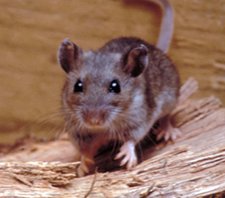First human case of hantavirus in Riverside County

The first human case of hantavirus in Riverside County was recently confirmed by health officials.
County officials said they believe the patient might have been exposed to deer mice droppings or urine that contained hantavirus while in the Whitewater area. The individual was briefly hospitalized and is recovering at home.
Hantavirus is usually found in remote wilderness areas and impacts humans in areas where deer mice droppings are left behind, such as cabins and rest areas. Officials emphasized that hantavirus infection is rare and can cause serious illness. It can frequently become fatal, but there are steps the public can take to reduce exposure.
It is not transmitted from human to human.

Other rodents that are known to carry the disease include cotton rats, rice rats, and white-footed mice, according to the Centers for Disease Control and Prevention.
Officials said it is caused by a virus that individuals get through contact with the urine, droppings or saliva of infected deer mice. Breathing small particles of mouse urine or droppings that have been stirred up into the air is the most common means of acquiring infection. The illness starts one to six weeks after exposure with fever, headache, and muscle ache, and progresses rapidly to severe difficulty in breathing and, in some cases, death.
Health officials put out a call urging people who frequent remote areas of Riverside County to take precautions.
“The confirmation of this case reminds us of the importance of key safety practices when coming in contact with animals and the bacteria and viruses they may bring with them and leave behind,” said Dr. Jennifer Chevinsky, deputy public health officer for Riverside County. “There are simple steps the community can take to protect themselves.”
- Avoid areas, especially indoors, where wild rodents are likely to have been present.
- Keep food in tightly sealed containers and store away from rodents.
- Keep rodents out of buildings by removing stacked wood, rubbish piles, and discarded junk from around homes and sealing any holes where rodents could enter.
- If you can clean your sleeping or living area, open windows to air out the areas for at least two hours before entering. Take care not to stir up dust. Wear plastic gloves and spray areas contaminated with rodent droppings and urine with a 10% bleach solution or other household disinfectants and wait at least 15 minutes before cleaning the area. Place the waste in double plastic bags, each tightly sealed, and discard in the trash. Wash hands thoroughly afterward.
- Do not touch or handle live rodents and wear gloves when handling dead rodents. Spray dead rodents with a disinfectant and dispose of in the same way as droppings. Wash hands thoroughly after handling dead rodents.
"It is important to seal up (seal up holes inside and outside the home to prevent entry by rodents), trap up (trap rodents around the home to help reduce the rodent population), and clean up (clean up rodent food sources and nesting sites)."
- Riverside county health officials
Hantavirus was first identified in the United States in 1993 and the virus has since been found throughout the United States.
In Riverside County, health officials said that while the virus has been found in past years during surveillance of rodents and animal droppings, this may be the first confirmed human case.
Since 1993, when testing for the virus began, there have been 90 confirmed cases in California.
When you are in wilderness areas or places that harbor mice, you can take the following steps to prevent infection:
For additional information on preventing the spread of hantavirus, visit CDPH's Hantavirus Cardiopulmonary Syndrome and the federal Centers for Disease Control and Prevention's hantavirus website page.